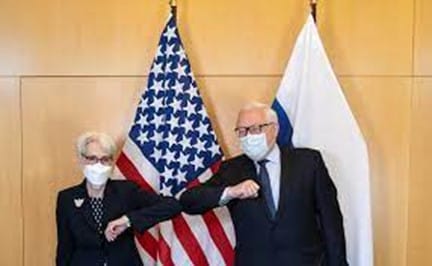On January 10, 2022, Deputy Secretary of State Wendy R. Sherman headed a U.S. interagency delegation comprised of State Department, Defense Department, Joint Staff, and National Security Council officials to meet with a Russian delegation headed by Deputy Foreign Minister Sergey Ryabkov.[1] As Russia's demands for a rollback of NATO in Eastern Europe had no give, and the US could not acquiesce without being publicly humiliated, the assessment was that the talks would be stillborn. Perhaps, the Western rejection of Russia's demands were intended to furnish a pretext for an invasion of Ukraine.
Not so fast argues senior Moskovsky Komsomolets commentator Mikhail Rostovsky in an article titled 'The Taming of NATO an Analysis of Putin's Complex Strategy/ Why the Kremlin Is Unafraid of a Breakdown in the Geneva Talks with the Americans'. This is not the Yeltsin era or even the early Putin era, when Russia had no rejoinder to NATO's eastern enlargement that included former Soviet Bloc countries in Eastern Europe, and then the Baltic Republics of the defunct Soviet Union. Now, Russia has numerous arrows in its quiver, and it is not limited to an attack on Ukraine, an attack that Rostovsky believes will lead the country into a dead end. If NATO wants to deploy in areas sensitive to Russia, Russia can do the same in areas sensitive to the US, with its newly developed weapons. This means that if the current round of talks breaks down, the US will soon be forced back to the table to negotiate over Russia's response. Rostovsky turned out to be prescient or well connected, as Ryabkov in an interview refused to confirm or deny Russian deployment in Cuba or Venezuela.[2]
Rostovsky's analysis follows below:[3]

Wendy Sherman and Sergey Ryabkov (Source: Rbc.ru)
"The US - Russia negotiations in Geneva started 'fantastically.' 'Russo-American talks may be over before they have even begun.' 'NATO should clear out and head for its 1997 borders.' 'There is a high probability that we will encounter reluctance on the part of our US and NATO colleagues to understand our requirements.' Disagreements and the clash of directly opposite assessments and forecasts on the eve of major diplomatic events is an inescapable part of life.
"However, all the aforecited 'dissonance' issues from the mouth of one man, Moscow's main 'knight' on the Geneva diplomatic battlefield, Lavrov's deputy, Sergei Ryabkov. Is our Foreign Ministry trying to confuse the adversary and deprive him of psychological confidence by publishing such diverse assessments? I suspect that another thing is true, our supreme negotiator himself doesn't really understand what kind of surprises he will face.
"But here is another key difference from the times of Gorbachev, Yeltsin, Medvedev, or even the early Putin. The Kremlin is signaling that it is ready for any turn of events. Putin's complex plan clearly provides for various scenarios. Let's try to decipher it.
"Recently, one of our retired foreign policy high officials told me how, during the first wave of NATO eastward expansion in the 1990s, they sat down with [the late foreign minister] Yevgeny Primakov and discussed all the options in detail, 'How can we counter the process of the NATO alliance's enlargement? What leverage remains at Moscow's disposal?' The result of this brainstorming session was a disheartening formula, 'nothing and no leverages.' This has become the cornerstone of Russia's long-standing strategic policy, if we cannot prevent unpleasant developments for us, then we must accommodate ourselves to these unpleasant things as best we can.
"What has changed for Russia in this respect since the times of Yeltsin and Bill Clinton? Well, many things, both positive and negative ones. I'll start with the minuses. In an interview with 'RIA Novosti' newspaper Sergei Ryabkov made a very hardnosed statement regarding his US colleagues' capacity as negotiators, 'They are uncomfortable about engaging in bilateral dialogue with us. They sense the eyes and ears of the most anti-Russian group in NATO upon them.'
"All too true. On the one hand, the British, Poles, Lithuanians, Latvians, Estonians, and others are 'little brothers,' who one can and should dismiss from the table when the 'big boys' are negotiating. However, on the other hand, the Biden team cannot and will not completely ignore their stance, especially considering that not only those mentioned by Ryabkov are breathing down their backs.
"Moscow's rigid declared position 'no new NATO members, period!' ruffled not only the usual 'sworn friends of Russia,' but also those, who previously predicated their well-being on close and tight relations with our country. 'We preserve the right to apply for NATO membership. We must value this freedom of choice,' this recent statement by the Prime Minister of neutral Finland, Sanna Marin could be described as a highly dubious 'success' of Russian diplomacy.
"Naturally, I don't believe that hot-headed Finnish guys (and gals as well) will make reckless and impulsive decisions on the base of pure emotion. But one can spot a very important hint in Finland's position. Moscow's official demand that NATO formally pledge to forswear further enlargement towards Russia is unrealistic. Insisting that your opponent undergo a public humiliation is possible only if you have an absolute preponderance of power. Russia has no such advantage.
"Suppose a miracle happens and Biden solemnly swears, 'there will be no new NATO members! I guarantee it!' Will his successor be bound by this 'Biden promise'? Definitely not. As the fate of the Iranian nuclear deal demonstrates, the US president's signature under any international treaty isn't binding upon his political successors. Furthermore, Biden may lose his free hand on the Russian track even during his term in the White House.
"They say that during his triumphant visit to Davos a few months before the 1996 Russian presidential election [against Yelstsin], [the Communist leader] Gennady Zyuganov caused an outburst of enthusiastic laughter amongst a group of American Republican congressmen when he remarked in jest, 'We have the same enemies! Both you and I want to beat the Democrats!' But now this approach no longer works. When a Republican president occupies the White House, the Democrats in Congress fiercely chide him for his 'shameful softness' toward Putin. And when control over the US presidential residence changes to the other side, the roles are reversed, as well. Now, Republican congressmen begin scolding the Democratic president for 'groveling to Putin.' The fun will really begin if the Democrats lose control of Congress in the midterm elections later this year. Talks with Biden's team would then become partly pointless in this case.
"So, what is Russia's ace in the hole? Is it that Russia no longer feels like a 'peasant with nowhere to go?' The Kremlin is morally ready for a breakdown in the talks and has clearly prepared a concrete plan of action for this case. What points appear in this plan, naturally, remains a 'mystery of the investigation.' [a play on an eponymous TV program]. But we can still predict something. What Moscow is vehemently accused of in the West (i.e. if Putin will be dissatisfied with the talks' progress, he will attack Ukraine) means an absolute dead end for our country. In this case, Russia will turn [as in Gogol's play 'The Inspector General' into a 'non-commissioned officer's widow who flogged herself'
"The only thing that makes sense is what another Lavrov deputy, Alexander Grushko, mentioned at the end of last year, 'the creation of counter-threats.' I believe, that what hides behind this wording was best explained by well-known political analyst Dmitri Trenin in his recent interview to 'Fontanka'.
"'Most likely, Russia's response won't be a military one, but a military-technical one. This means the deployment of various kinds of arms (including those recently tested) in regions and maritime zones that are sensitive to the US, the deployment of Russian military and arms in various new territories, the strengthening of the Russia-Belarus military alliance, the development of coordination and the strengthening of cooperation with China's armed forces.'
"The beauty of this approach is that it will prompt the West to new rounds of negotiations. There could be many more 'Geneva talks' and if the parties fail to reach an agreement the first time around, they may succeed after the second, third, or twenty-third round of talks."

Mikhail Rostovsky (Source: Mk.ru)








